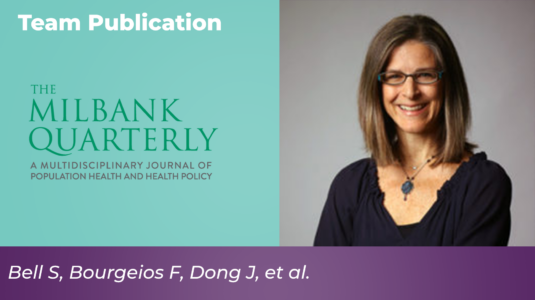A new study from OpenNotes shows patients and families who read open notes hold unique insights and can catch potential safety hazards that are difficult for clinicians or organizations to see.
DesRoches, Catherine
Open notes in patient care: confining deceptive placebos to the past?
In some countries, the practice of “open notes” is advanced with patients using online portals to access their clinical records. In this report, the authors reflect on the consequences of access for placebo prescribing, particularly for the common practice of deceptive placebo use, in which patients are not aware they are being offered a placebo.
Shared access to patient portals for older adults: Implications for privacy and digital health equity
This viewpoint article discusses challenges and opportunities of systematic engagement of care partners through shared access to the patient portal that have been amplified in the context of the COVID-19 outbreak and recent implementation of federal information blocking rules to promote information transparency alongside broader shifts toward care delivery innovation and population aging. We describe implementation considerations and the promise of granular, role-based privacy controls in addressing the nuanced and dynamic nature of individual information sharing preferences and fostering person- and family-centered care delivery.
Attitudes, experiences, and safety behaviours of adolescents and young adults who read visit notes: Opportunities to engage patients early in their care
Today’s adolescents and young adults have grown up immersed in technology, but their interest in and benefit from reading their care notes online is not well understood. In our study, the majority of AYA read notes and rated them as extremely important for several engagement and safety behaviours. Although a similar proportion of AYA reported definite or possible errors in their notes as adults, fewer spoke up about them, citing knowledge and cultural barriers like fear of conflict. Taken together, these findings support initiatives that encourage AYA to read notes and share concerns. Efforts that include note-reading may help transition patients from paediatric to adult care with greater autonomy, activation and safety partnership.
Patients Contributing to Visit Notes: Mixed Methods Evaluation of OurNotes
OurNotes interests patients, and providers experience it as a positive intervention. Participation by patients, care partners, clinicians, and electronic health record experts will facilitate further development.
Filling a gap in safety metrics: development of a patient-centred framework to identify and categorise patient-reported breakdowns related to the diagnostic process in ambulatory care
The PRDB framework, developed in partnership with patients/families, can help organisations identify and reliably categorise PRDBs, including some that are invisible to clinicians; guide interventions to engage patients and families as diagnostic partners; and inform whole organisational learning.
Patient Perceptions of Receiving COVID-19 Test Results via an Online Patient Portal: An Open Results Survey
This study evaluated patient perspectives related to receiving COVID-19 test results via an online patient portal prior to discussion with a clinician. Users found the portal easy to use but expressed mixed preferences about the means of notification of result availability (e.g., email, text, or phone call). Users found immediate access to results useful for managing their health, employment, and family/childcare. Many users shared their results and encouraged others to get tested. Our cohort consisted mostly of non-Hispanic white, highly educated, English-speaking patients. Overall, patients found open results useful for COVID-19 testing and few expressed increased worries from receiving their results via the patient portal.
The benefits and harms of open notes in mental health: A Delphi survey of international experts
This survey used a Delphi poll – an established methodology used to investigate emerging healthcare policy, including in psychiatry. International experts who included health professionals and persons with lived experience of mental healthcare were asked to give their opinions, anonymously, in three rounds of online surveys, and to offer their views about the potential benefits and harms of online access to mental health notes. Experts – drawn from 70 experts from six countries – agreed patients’ access to their mental health notes could offer multiple benefits and few harms.
How do older patients with chronic conditions view reading open visit notes?
Authors examined the experiences with and perceptions of the effect of reading clinical outpatient visit notes on older adult patients with multiple chronic conditions at three healthcare organizations with significant experience sharing clinical notes with patients. The majority of respondents had read two or more clinical notes in the 12 months before the survey. Patients with more than two chronic conditions were more likely than those with fewer or none to report that reading their notes helped them remember their care plan, take their medications as prescribed, and understand and feel more in control of their medications. Very few patients reported feeling worried or confused about their health or medications due to reading their notes.
Patients, clinicians and open notes: information blocking as a case of epistemic injustice
We address the contrasting perceptions of this practice innovation, and claim that the divergent views of patients and clinicians can be explained as a case of epistemic injustice. Using a range of evidence, we argue that patients are vulnerable to (oftentimes, non-intentional) epistemic injustice. Nonetheless, we conclude that the marginalisation of patients’ access to their health information exemplifies a form of epistemic exclusion, one with practical and ethical consequences including for patient safety.





